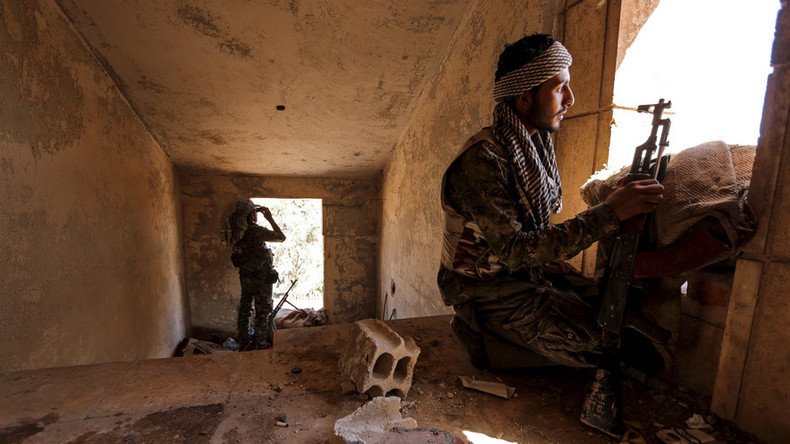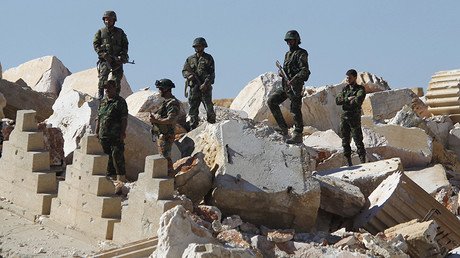Is the courage of the Kurds giving way to treachery in Syria?

Syrian Kurdish forces have been among the bravest and most effective in the war against ISIS in Syria. They may well be on course to also be the most treacherous.
Whether organized under the auspices of the PYD (People’s Protection Units) or SDF (Syrian Democratic Forces) there is no doubting that the role played by the Kurds in northern Syria in first resisting and now taking the fight to ISIS will go down in history.
However, as the Kurds continue their advance through Raqqa Province, closing in on Raqqa City itself, the de facto capital of the so-called Islamic State, any concerns the Syrian government may have when it comes to their ultimate objectives and intentions will not be mollified by the presence of US forces on the ground, embedded with the SDF in an advisory capacity.
Concerns in Damascus were initially raised in March, when at a meeting in the town of Rmeilan in Hasakah Province the Kurds and their allies unilaterally declared a northern autonomous federation, a declaration which the Syrian government immediately refused to accept or recognize. Preceding the declaration of the northern federation by the Kurds in March, US troops had taken control of an airfield just outside Rmeilan in January. It doesn’t take a genius to discern a connection between both.
Indeed, there is something undeniably murky when it comes to the manner in which the Americans have developed a close military alliance with the Kurds over the past few months, even at the cost of incurring the extreme displeasure of their NATO ally, Turkey. It suggests that in the Kurds and various other groups that make up the SDF, the Pentagon believes it has finally fastened onto the “third force” it has been trying to cultivate within the conflict as a wedge between the Assad government and ISIS with an eye on asserting a military and geopolitical presence in the country beyond the current conflict.
In this respect, there is no reason to believe that regime change in Damascus is off Washington’s table, though as with Iraq after the first Gulf War in 1990-91 the willingness of the US to abandon the Kurds as and when it suits should give them pause for thought when it comes to trusting any promises or pledges of support that come gift-wrapped in an American accent.
As for the Kurds, they are widely recognized as the largest stateless nation in the world, spread between four nations in the Middle East – Iran, Iraq, Syria, and Turkey – thanks to Sykes Picot, added to which you have a wider Kurdish diaspora spread mostly across Europe. There is no accurate figure when it comes to the size of the total Kurdish population today, but it is thought to number anywhere between 20-40 million. That being said, it would be a mistake to consider them a homogenous group. Indeed, how could they possibly be so after generations spent fragmented between different countries, regarded with suspicion and mistrust and experiencing regular bouts of repression in the process?
There are up to 2.5 million Kurds in Syria, predominately located in the north close to the border with Turkey, and in 2011 President Assad granted thousands of them citizenship, a gesture his opponents in the West dismissed as instrumentalist. Regardless, Syria remains a sovereign state and its people will not accept any of its territory being cleaved off in the context of a conflict in which over 60,000 Syrian soldiers and officers have lost their lives fighting for that sovereignty. Some of those Syrian soldiers and officers, as British journalist Robert Fisk wrote in February, were killed courtesy of the Kurds, when after the battle for the Mineq airbase in 2013 retreating Syrian soldiers made it to Kurdish held territory only to be handed over to the Islamists by the Kurds in exchange for Kurdish prisoners. The soldiers were then executed.
Though it has long ceased to matter in Washington, US ground forces operating in Syria without the prior consent of the legitimate government constitutes a violation of the country’s sovereignty and does not bode well when it comes to trusting US motives going forward. Where Washington is concerned neither the Syrians or Iranians or Russians are under any illusions, of course, and will no doubt be prepared for any eventuality.
Then there is the no small matter of Turkey’s determination to lump the Kurds in the same box with ISIS, which merely adds another layer of intrigue to this unfolding drama. The notion that Ankara would stand by while something approximating to a Kurdish state is established on its border at any time, never mind at a time when it is engaged in a military campaign to crush the PKK, is sheer madness.
It was the English poet William Blake who said, “It is easier to forgive an enemy than to forgive a friend.” The brave men and women of the SDF could do worse than keep it in mind.
The statements, views and opinions expressed in this column are solely those of the author and do not necessarily represent those of RT.















